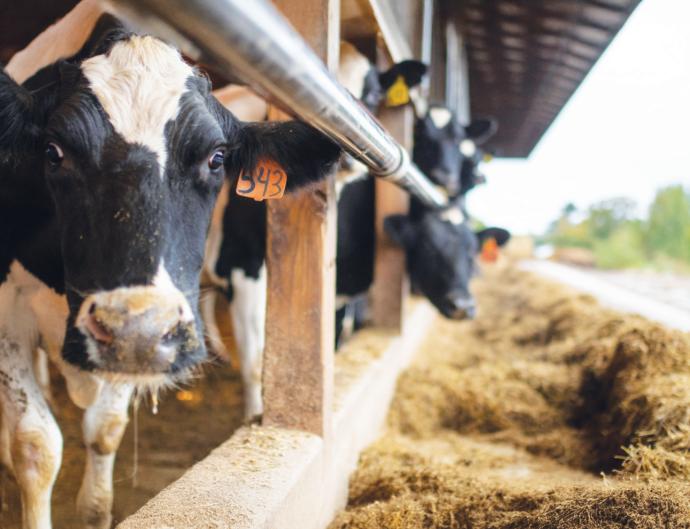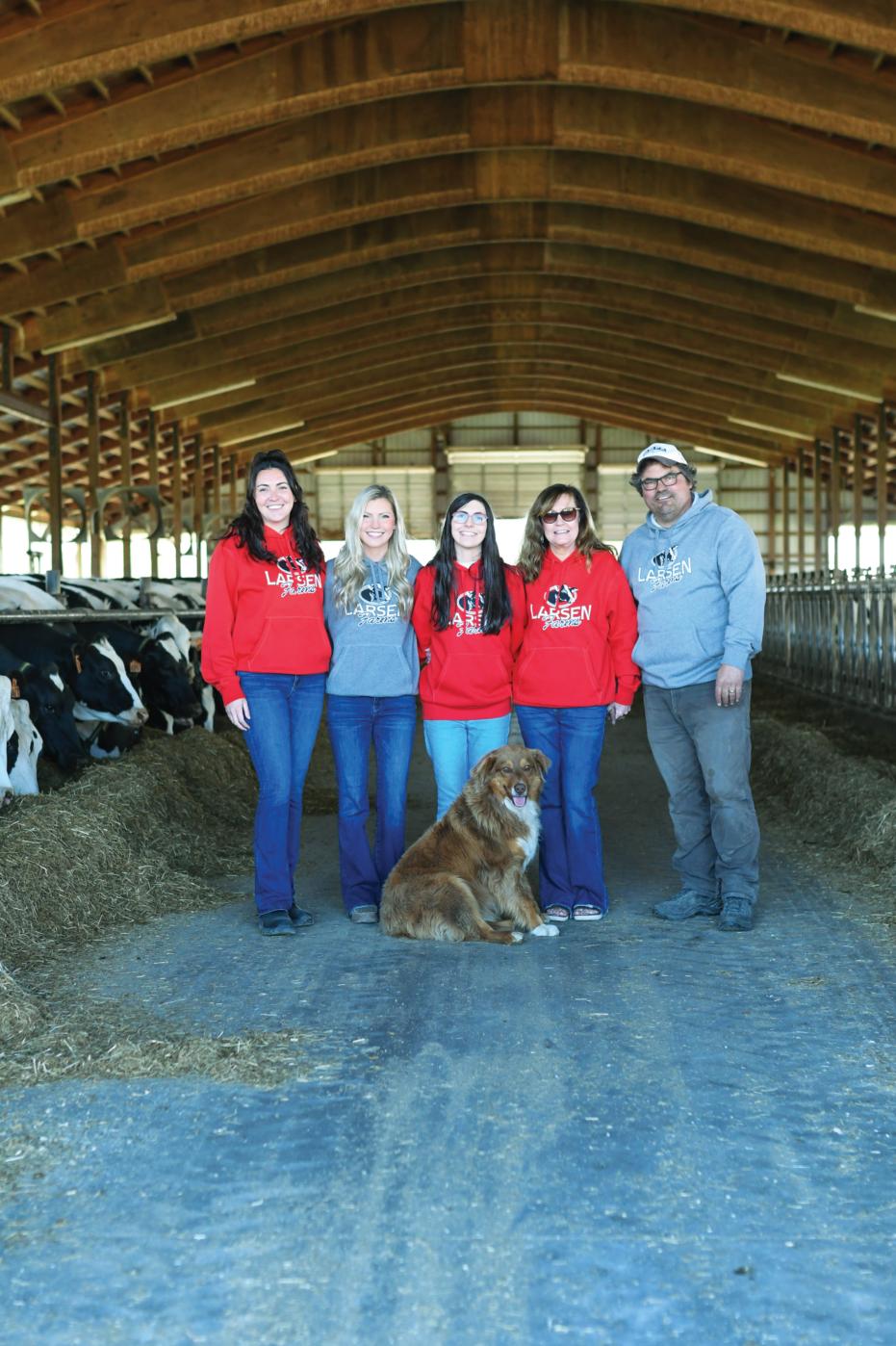
LARSEN DAIRY FARMS PARTNERS WITH CARITAS FOOD PANTRY




LARSEN DAIRY FARMS PARTNERS WITH CARITAS FOOD PANTRY


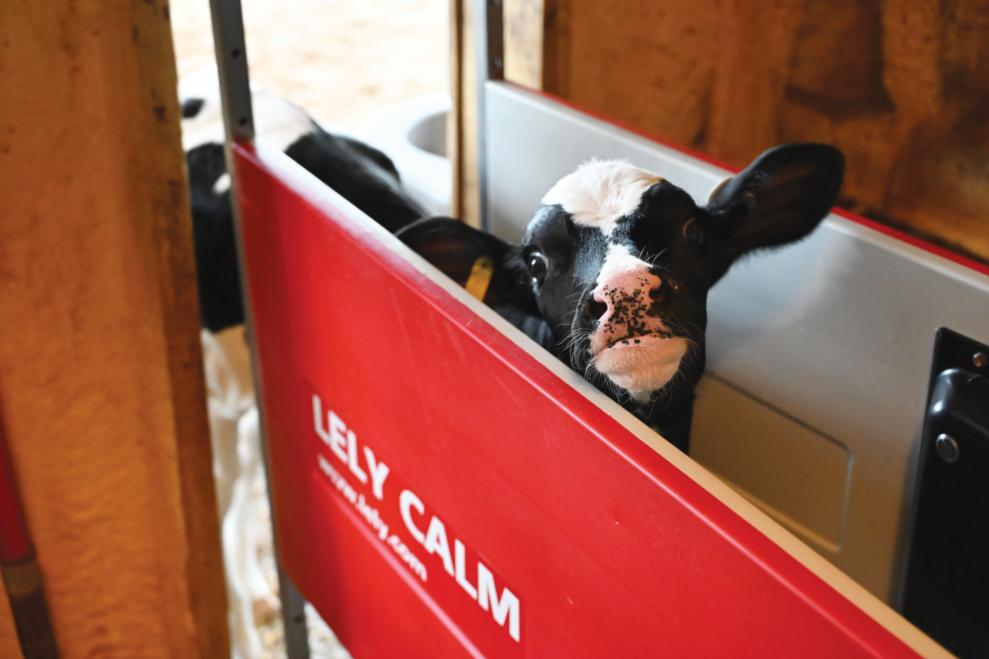
Larsen Farms has partnered with Caritas Food Pantry to provide fresh milk to local families each week, filling a crucial nutritional gap once limited by lack of refrigeration. After volunteering at the pantry as teenagers, the Larsen girls helped secure a grant for a commercial cooler and have continued to stock it with milk ever since. Their quiet, consistent support earned them the MMPA Food Bank Legacy Award, recognizing them for their lasting impact.
was honored with the 2025 Michigan Dairy Industry Service Award for nearly four decades of impactful leadership, service and advocacy at MMPA. From her start in a oneperson Member Relations department to her current role as Chief Corporate Affairs officer, Sheila has helped guide MMPA through major milestones and crises, all while championing the voices of dairy farmers with humility and dedication.


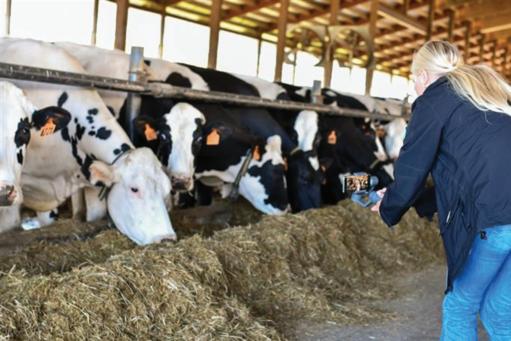
BY MIKAYLA BOWEN
As summer brings warmer days and lively community events, it’s also a season that reminds us of the generosity rooted in our cooperative values. Across the region, MMPA members continue to go above and beyond, not just in their commitment to producing quality milk, but in giving back to their neighbors. Many dedicate time and resources to help stock the shelves of local food pantries with nutritious milk, making a real difference for families in need.
This spirit of service was especially evident this year as the Larsen Family was honored with MMPA’s first-ever Legacy Award. Their award will support their local food pantry, helping ensure even more families have access to fresh milk (pg. 18).
There was also excitement when MMPA’s Chief Corporate Affairs Officer Sheila Burkhardt was recognized for her service to the dairy industry with the Michigan Dairy Industry Service Award (pg. 14). Sheila’s nearly 40-year career is a testament to her steadfast dedication, insightful leadership and humble strength that has shaped Michigan’s dairy community. Her knowledge and leadership are invaluable to the MMPA team. Congratulations, Sheila!
Brother’s Rodney and Robert Fowler aren’t afraid to challenge convention. They’re featured in this issue’s sustainability spotlight for their forward-thinking vision and use of technology to make sustainable decisions on their farm (pg. 14). In this issue you can also meet our 2025 summer interns (pg. 24), and you can learn about MMPA OYDC Ashley Kennedy’s experience on Capitol Hill representing her MMPA peers (pg. 13).
Milk Messenger (USPS # 345-320) is published bimonthly by the Michigan Milk Producers Association, 41310 Bridge Street, Novi, MI 48376-8002. Periodicals postage paid at Novi and additional mailing offices.
POSTMASTER: Send address changes to Milk Messenger, PO Box 8002, Novi, MI 48376-8002.
President and Chief Executive Officer Joe Diglio
Managing Editor
Sheila Burkhardt, Chief Corporate Affairs Officer
Editors
Emily Kittendorf-King, Editor & Advertising Manager
Mikayla Bowen, Editor messenger@mimilk.com
Publication Designer
Stacy Love rezudesign.com
Printing Foresight Group, Stacey Trzeciak staceyt@foresightgroup.net
Publication Office
MMPA Milk Messenger P.O. Box 8002, Novi, MI 48376-8002 p: 248-474-6672 f: 248-474-0924 e: messenger@mimilk.com w: mimilk.com
Established in 1916, MMPA is a member owned and operated dairy cooperative serving dairy farmers in Michigan, Indiana, Wisconsin and Ohio.
An Equal Opportunity Employer – F/M/V/D
Subscriptions: mimilk.com/subscribe
MMPA members - 50¢ per year
Non-members - $5 per year
Circulation: 2,600 (ISSN 0026-2315)
BY SUDEEP JAIN, MMPA DIRECTOR OF QUALITY

At MMPA, quality is our number one core value. And for us, it’s not just a slogan, it’s a deeply held value that guides every decision we make, from the production floor to the boardroom. We also understand that the safety and quality of our products are only as strong as our weakest link. That’s why we invest in every part of the process, ensuring that no detail is overlooked, and no team member is left behind.
A cornerstone of our food quality and safety program is our commitment to the Global Food Safety Initiative’s Safe Quality Food (SQF) audit program. Every one of our plants undergoes this audit on a yearly basis. This audit evaluates infrastructure, practices, policies and behaviors in a food production facility against the SQF Code, a globally recognized standard. This standard is respected and recognized by our customers who use this as a tool to assess their vendors and the comprehensive process holds MMPA accountable for maintaining the highest standards.
This year, our plants in Canton, Ohio, and Constantine and Ovid, Michigan, all received Excellent scores with Canton receiving 100% for food safety and 98% for food quality; Constantine receiving 100% in both categories; and Ovid receiving 99% for food safety and 100% for food quality.
This success did not happen by chance. It was a result of the hard work of our people. We are fortunate to have smart, dedicated individuals working across all our facilities. Intelligence alone isn’t enough though, we must empower our teams with the right resources, tools and knowledge. When we enable our people to excel, we elevate the entire organization. Training, mentorship and access to cutting-edge technology are all part of our strategy to build a culture of continuous improvement. Examples of this are our investment in upgrading our plants’ infrastructure and investment in technology. Teamwork is the key to any success and nowhere is that more evident than in our approach to the SQF audit. Collaboration across various departments in Canton, Ohio, and with teams across the organization ensured that best practices are shared, and challenges are addressed collectively. We streamlined decision making and provided the required resources to teams. We used collaboration tools to streamline communication, organize data and manage workstreams efficiently.
From sanitation crews to the plant manager, quality assurance to customer service, and from finance to the dispatch team, everyone plays a vital role in delivering safe, high-quality food to our customers. Their dedication was very visible during the audit and approved in the form of a good score by the independent auditor.
We are proud of this team and the culture we’ve built together. And with the right people, tools and mindset, we’re confident in our ability to uphold that mission every single day. We are replicating this successful model in our other facilities as they prepare for their audits. Afterall, at MMPA, food safety and quality aren’t just a requirement, it’s a shared commitment to excellence.
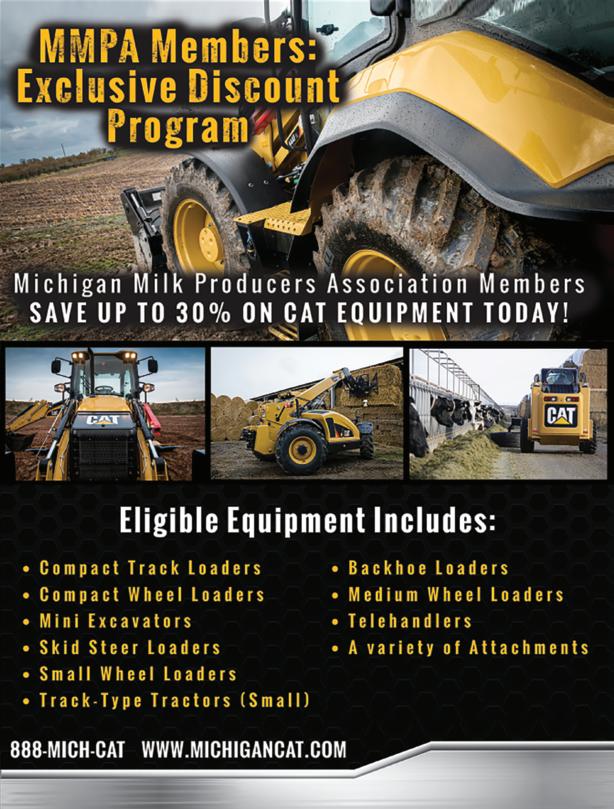
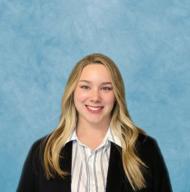
Producers that are looking to gain efficiency in the field may turn to precision nutrient management practices, whether it be decreasing fertilizer use, better manure application or improving overall soil health. A potential barrier to the implementation of these advanced practices is financing, but there are several programs available that producers can leverage.
The Natural Resource Conservation Service (NRCS) offers a voluntary conservation program, the Environmental Quality Incentives Program (EQIP), where eligible producers can receive cost-share payments. Your local NRCS office can help with the application process and work with you to develop a conservation plan based on the needs of your operation.
MMPA has also offered programs with cost-share incentives for advanced nutrient management. In the past, we have seen practices such as soil sampling, variable-rate nitrogen application and yield monitoring systems. Enrollment announcements for these programs will be shared online and at membership meetings. You can also reach out directly to me, Rachel.rogers@mimilk.com, with questions or for more information.
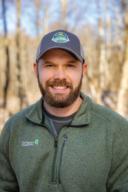
Effective nutrient management starts with understanding what’s already in your soil. That’s why soil sampling is the foundation of any well-informed Nutrient Management Plan (NMP). A quality soil sample gives you a clear picture of nutrient levels, pH, and other key factors that influence crop response and fertilizer efficiency.
There are several ways to approach sampling, and the best method depends on your goals. Grid sampling is ideal for precision management, offering a detailed view of field variability that can drive variable-rate applications. Zone sampling (based on soil type, yield data, or topography) can be a cost-effective way to capture variability across larger areas. For some operations, traditional composite sampling may still be appropriate. The important thing is to be consistent in how and when you sample, and to use a lab you trust for accurate results.
Once you have your soil test data, you can make informed decisions about what nutrients are truly needed and in what amounts. This helps support yield goals, reduce input costs, and minimize nutrient losses to the environment. A well-built NMP starts here, using your own field data to guide smarter, more efficient decisions throughout the season.

Brian DeMann MMPA BOARD MEMBER
As dairy farmers, we operate in ways that maximize our return on investment. Over the last 10 years, we’ve trialed and implemented precision agriculture (ag) equipment and practices on our farm. It’s a process you can gradually adopt and utilize.
Start by identifying an area in crop production or nutrient management that you believe could perform better. Ask yourself: Could precision ag improve this?
Precision ag has brought labor efficiency, easier documentation and recordkeeping, reduced fuel, fertilizer, seed and water costs, and increased our crop yields.
Find a dealer that offers strong customer support, they can help with the initial setup and troubleshoot any issues that arise. Talk to neighboring and fellow farmers who may already be using precision ag technologies. If you choose similar equipment, you’ll be able to help each other out with questions and solutions.
Maybe owning the equipment doesn’t make sense for your operation. You can still benefit from these technologies by working with custom applicators who use precision ag and can deliver similar returns.
Precision ag is changing the way we stay sustainable and successful for the good.
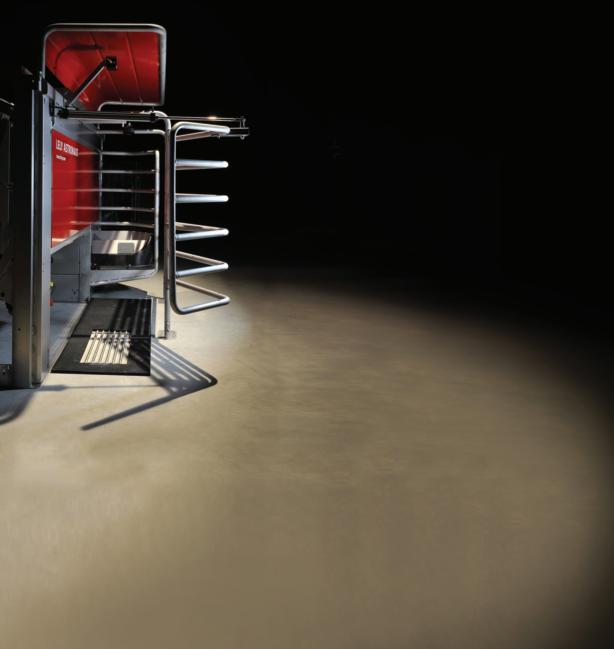

More than thirty years ago, Lely introduced the world’s first commercially available robotic milking system. Three decades later, we’re bringing another first to dairy producers in North America. Introducing Lely Certified Pre-Owned. Field-proven Lely Astronaut robotic milking systems, inspected, sanitized and certified back to original equipment standards. Competitive savings combined with Lely’s legendary performance, efficiency and reliability make it an easier choice than ever to switch your barn to automation. We even include a Lely-backed limited 12-month warranty. Lely Certified Pre-Owned systems give producers the advantages they need, at the savings they want, with the peace of mind they deserve. Lely, the future of dairy™.

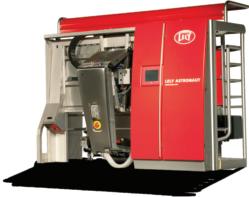
MMPA represented during Dairy Sustainability Alliance
The Dairy Sustainability Alliance Spring Meeting brings together dairy processors to collaborate on solutions in sustainability, with a particular focus during this meeting on updating and highlighting the work organizations are doing in reporting and accounting. This year, MMPA President and CEO Joe Diglio provided a recap on HPAI in Michigan, highlighting the cooperative’s leadership and commitment to supporting members and coordinating with industry partners. In addition, MMPA Sustainability Manager Nico Gutierrez-Riera shared an update with the Innovation Center for U.S. Dairy’s Processor Working Group on MMPA’s greenhouse gas allocation and product carbon footprinting initiative in partnership with The Climate Source.
Beginning on June 1, updates to the Federal Milk Marketing Order (FMMO) pricing formulas were implemented marking the culmination of a multiyear process initiated and led by the National Milk Producers Federation and supported by member cooperatives, including MMPA.
The changes including restoring the “higher-of” Class I price mover for most milk, updating the dairy product make allowances and the Class I differentials nationwide, and discontinuing the use of barrel cheese to determine the Class III price. A final part of the Rule, to increase the component composition factors for skim milk in all FMMO price classes, will be implemented with a six-month delay on December 1, to avoid disrupting existing risk management positions.

ALBERN OLSON *
SPRING LAKE FARMS LLC *
RONALD J & LOUIS BRECHT
FISK FARMS
ELDRED FARMS
WILLIAM HOUGH
TJERK OKKEMA
JEFF L NIELSEN
BOLLINGER FARMS LLC
DUTCH MEADOWS DAIRY LLC
BENJAMIN SEEFELDT
TROY HAYNES
MARK WILES
S & T DAIRY LLC
CHAD PETERS
TLC DAIRY
FRIESEN LEGACY FARM LLC
KEVIN LITWILLER
*100
During the June National Milk Producers Federation (NMPF) Board of Directors meeting, the board took several important actions, including voting to launch a new member-funded export assistance program called NEXT (NMPF Exports & Trade). The program is a successor organization to the Cooperatives Working Together export assistance program. The NEXT program will focus on supporting U.S. dairy exports in key markets around the world, including Latin America, the Caribbean and Asia. A majority of the milk supplied to consumers worldwide by NMPF members is supporting the NEXT program with a 2 cent/cwt contribution. The program will begin July 1, 2025.
MMPA members, children of members and employees of members attending Michigan State University (MSU), Purdue University or The Ohio State University are eligible to apply for MMPA scholarships.
Authorized by the MMPA Board of Directors, the scholarships encourage post high school study for careers in dairy management to continue the education and implementation of innovation on member’s dairy farms.
Students attending MSU who are pursuing a dairy management certificate in the Institute of Agricultural Technology or who are enrolled in the Dairy Concentration Program in the Department of Animal Science may apply for $1,750 per semester (for members or children of members) or $1,500 per semester (for employees of members) scholarship monies. Preference given to those students enrolled in the 2-year dairy management program. Scholarship applications are due by September 1.
At Purdue University and The Ohio State University, there is a $1,000 scholarship available for a student who is a member or child of a member enrolled in any agriculture-related major.
To apply online or to find more information about scholarships, please visit mimilk.com/scholarships.
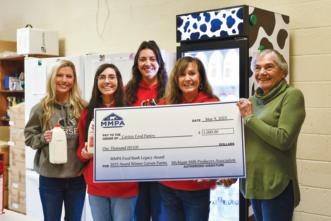
The Michigan Milk Producers Association (MMPA) proudly announced Larsen Farms of Scottville, Michigan, as the first recipient of the MMPA Food Bank Legacy Award, in partnership with the Food Bank Council of Michigan.
As longtime supporters of their community and local food pantry, the Larsen family has consistently demonstrated a deep commitment to fighting food insecurity. Several years ago, they secured a grant to purchase a stand-up cooler for Caritas Food Pantry, enabling them to donate milk weekly and volunteer their time to support pantry operations.
“Larsen Farms exemplifies what it means to be a good neighbor and a dedicated dairy farmer. Their consistent efforts to support their local food bank shows how impactful it can be when farms give back to their communities,” said Doug Chapin, MMPA Board Chairman. “It’s an honor to recognize the Larsen family with the first Legacy Award in recognition of their partnership with their local food pantry.”
In 2023, in honor of past MMPA Board President Ken Nobis, who played a critical role in establishing the original partnership, the MMPA Board of Directors and the Food Bank Council of Michigan created a Legacy Award. This award builds upon our existing outreach efforts, expanding support from dairy community events to youth development programs and local food banks.
Read more about the Larsen family and their efforts to combat food insecurity on page 18.
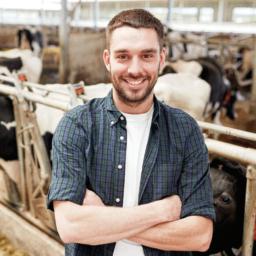
We know your farm operations are constantly evolving. That could mean the need for land, buildings, renovations, or anything in between. GreenStone has been helping farmers and agribusinesses make the investment in the land they need for over 100 years.
With locations across Michigan and northeast Wisconsin, we're here when you're ready to talk.
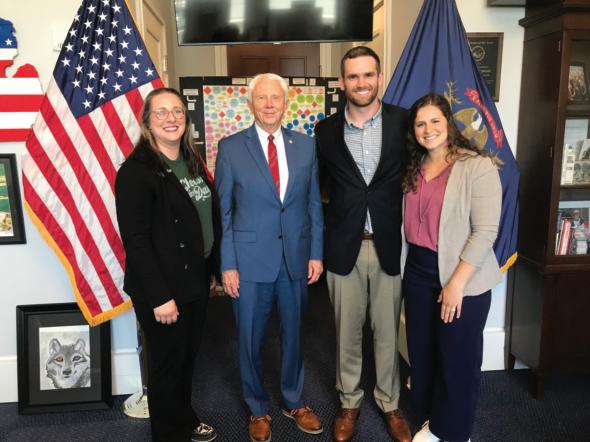
Ashley Kennedy and Jake and Lauren Buning, 2024 MMPA
Outstanding Young Dairy Cooperator winner and runnersup, respectively, joined other young dairy farmer leaders from throughout the U.S. in Washington, D.C. in June for the National Young Cooperators (YC) Program’s annual Dairy Policy and Legislative Forum, held in conjunction with NMPF’s June Board of Directors meeting.
The event brought together young dairy leaders from 15 states for two days of education and advocacy on Capitol Hill, discussing key dairy priorities directly with members of Congress and staffs to advocate for the Whole Milk for Healthy Kids Act, agricultural labor reform and strong dairy trade policies.
“Through MMPA’s Young Cooperator (YC) program, the Outstanding Young Dairy Cooperator (OYDC) program offers members under 41 a unique chance to connect with peers both within our cooperative and nationwide, while sharpening their leadership skills,” said Jessica Welch, MMPA Member Relations Coordinator. “Participation in the NMPF National YC program is just one of the many valuable opportunities available to OYDCs to grow professionally and build lasting relationships across the dairy industry.”
MMPA members under the age of 41 interested in representing their cooperative in this way are encouraged to participate in MMPA Young Cooperator events and share their interest with Jessica Welch at 248-897-3400 or at jwelch@ mimilk.com.
BY ASHLEY KENNEDY
Going to Washington, D.C. with the National Milk Producers Federation (NMPF) Young Cooperator (YC) Program was really enlightening. At every national YC meeting, I leaving knowing more about NMPF: from their history, to how the employees do a fantastic job representing cooperatives and their members, and to giving farmers fantastic opportunities to discuss issues that are affecting them daily.
It is always impactful learning about how to connect and talk to legislators and their staff and the crew at NMPF did a great job of making sure we were prepared. I have never felt more confident going into a Hill meeting. Our group from MMPA had meetings with all of our legislator’s offices, which is an opportunity I haven’t had before. While meeting with legislators, we talked about issues facing dairy like labor challenges and the importance of our export market. The meeting was also an opportunity to network with other Young Cooperators from across the country and to talk to NMPF board members and staff. These people want to get to know you too and the discussions are great. If you’re on the fence about running for Outstanding Young Dairy Cooperator (OYDC), don’t be. Just do it because these are experiences you can only get here.


The National Milk Producers Federation (NMPF) and the U.S. Dairy Export Council (USDEC) have been closely engaged with the Trump administration as it continues to hold trade negotiations with partners across the world, emphasizing the need for targeted actions on trade barriers.
In the lead-up to President Trump’s April 2 announcement on a “Fair and Reciprocal Plan” to address U.S. trade deficits, NMPF and USDEC submitted joint comments to the U.S. Trade Representative (USTR), urging the administration to focus on addressing specific tariff and nontariff trade barriers restricting U.S. dairy exports. Taking a focused, rather than broad-brush approach to leveraging tariffs, NMPF and USDEC detailed bilateral dairy trade measures among 21 countries and regions for the administration to prioritize.
Building on the comprehensive comments, NMPF’s Shawna Morris and Jaime Castaneda are serving in formal confidential trade advisor roles to the U.S. government. This allows NMPF to work on confidential materials with the U.S. government as the negotiations progress. In addition, NMPF continues to advocate on behalf of the U.S. dairy industry with administration officials, congressional offices and foreign government officials. Prioritized areas include the importance of addressing the U.S.-EU dairy trade imbalance, preserving trade flows with positive partners like Mexico, eliminating tariffs to create a more level playing field in export markets, and addressing nontariff barriers like unscientific certification requirements, monopolization of common cheese names and lengthy dairy facility approval processes.
In honor of June Dairy Month, Michigan’s dairy industry came together in June for the annual Michigan Dairy Foods Awareness Day, held on the Capitol Lawn in Lansing. This event shines a spotlight on the vital contributions of Michigan’s dairy sector to the state’s economy and food supply.
Throughout the day, state legislators had the opportunity to sample a variety of complimentary dairy snacks and beverages while connecting directly with local dairy processors.
This year, MMPA proudly distributed Nurri, a high-protein milk shake made with MMPA milk, highlighting their partnership and commitment to innovation and nutrition in dairy products.
The Presidential Commission to Make America Healthy Again (MAHA), a special task force in the Department of Health and Human Services, released an assessment in May that identifies key drivers behind childhood chronic diseases in the United States. The report explores the potential effects of “ultra-processed foods”, childhood exposure to chemicals through food and water sources, decreasing levels of physical activity, and medications and vaccination schedules.
“NMPF supports policies that allow its member cooperatives and the farmers who own them to use every tool and innovation they need to manage their farms safely and efficiently”, the organization said in a statement in response to the report. “NMPF stands behind sciencebased evidence and encourages integrating scientific and technological advancements into farming practices. The federation appreciates the commission’s recognition of dairy products, and specifically whole milk, as part of a healthy diet. NMPF also is encouraged by the report’s support for nutrient-dense foods as a compelling nutritional choice.”
The report specifically notes the success of USDA’s Special Supplemental Nutrition Program for Women, Infants, and Children (WIC) in improving overall health and nutrition outcomes for those that qualify for the program. NMPF has fought for years to protect dairy access through this program because of the key nutrients dairy provides. NMPF will continue to support access to nutrient-dense dairy products through these types of government programs, including school meals, to help some of our most vulnerable populations.
BY MIKAYLA BOWEN
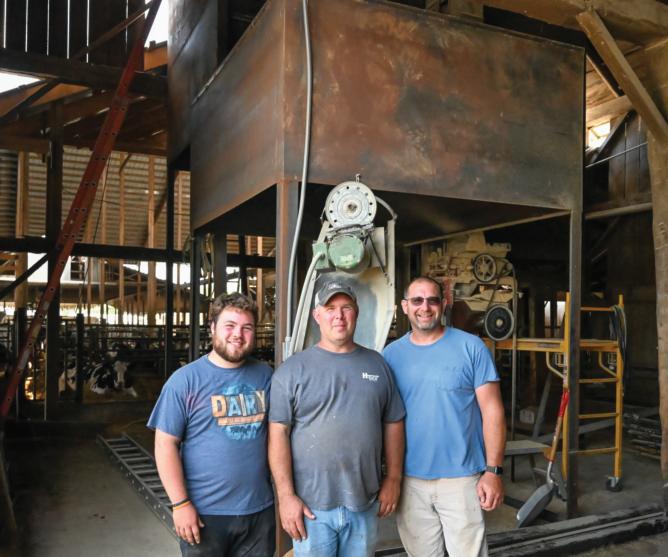
MMPA IS COMMITTED TO COOPERATIVE SOCIAL RESPONSIBILITY AND SUSTAINABLE BUSINESS PRACTICES THROUGHOUT OUR ENTIRE SUPPLY CHAIN. AT THE FARM LEVEL, MMPA MEMBERS ARE ALSO ON A SUSTAINABILITY JOURNEY. WE’RE CHECKING IN WITH A HANDFUL OF MEMBER FARMERS LEADING THE CHARGE WITH THIS SUSTAINABILITY SPOTLIGHT SERIES.
First-generation dairy farmers Rodney and Robert Fowler aren’t afraid to challenge convention. The two brothers, along with Rodney’s son Ben, operate a progressive dairy farm in Chesaning, Michigan, where innovation and sustainability are always top of mind. What began just before Rodney’s 15th birthday with the calving of their first heifer has since evolved into a thriving dairy business, supporting over three families, 200 cows and a vision that never stops moving forward.
The Fowlers are always trying new things to run their operation as efficiently as possible. “We’re not smarter than anybody else,” Robert says modestly. “But we work hard at doing the right thing at the right time, and we’re always learning.”
One of their first significant changes to tackle labor challenges was the installation of four Lely A4 robotic milkers 10 years ago. Their original setup, stanchions converted to a double-eight parlor, is now a labor-saving robotic system that milks cows more efficiently
and more frequently while improving cow care. This past November they made the upgrade to the latest Lely A5 models.
“The upgrade in models alone has saved us 40 seconds of milking time per cow and allowed high-producing fresh cows to be milked four to five times a day, improving animal comfort and milk production,” stated Rodney.
Shortly after the robots were installed, the Fowlers increased their focus on how they could raise healthier heifers.

Rodney explains, “In 2017 we installed robotic calf feeders in the old stanchion barn. The ceilings were too low and we struggled with ventilation, so in 2021 we built a new barn for the calves.”
Robert adds, “The goal was to raise better heifers, and that’s why we built the barn, for a healthier calf, and in two years a healthier cow.”
Their approach is labor-efficient too. With only Rodney, Robert and Ben, full-time employee Brad of 25 years, their mother and a part-time calf feeder making up the labor force, automation is critical to their continued success.
Looking to the future, Ben hopes the farm will grow, but acknowledges it hinges on labor availability, “In 15 years I would like to grow the dairy, but it depends on labor. My dad and uncle may want to slow down and I’ll have to consider what can be done with one or two workers.”
“We want to still be a dairy farm in 15 years,” Robert adds, noting plans to add an automated Lely Vector feeding system and automatic alley scrapers to continue improving efficiency.
One of the most impactful operational improvements has been the installation of their soybean roaster. About a year and a half ago they started roasting higholeic soybeans, a cost-effective and more sustainable alternative to imported palm fat.
“If we weren’t feeding roasted beans, we wouldn’t be getting over 4% butterfat and 100 pounds of milk per cow,” Rodney says.
Along with the roasted beans being included in the cows partial mixed ration (PMR), they are also targeted to individual cows based on need.
“The robotic milkers evaluate each cow’s production and dispense beans accordingly, some receive up to six to eight pounds per day, while about 60 cows don’t receive any at all,” Rodney explains.
They’ve even optimized the roasting process, cutting the energy demand from
a 24 hour per day roller mill to just 40 minutes of operation every three days.
“Our goal is to get the most out of every resource,” Rodney explains. “Whether it’s a cow, a half-acre or a full acre of land, we’re not okay with average. We aim to be in the top 25 percent of producers.”
With sandy soils and a desire to improve crop yields, the Fowlers have embraced cover cropping to build healthier soils.
While pest pressures from slugs and seed corn maggots have created learning curves, Robert remains focused, “It’s about doing a better job than we did last week, every year. We’re always grabbing at the short straws, learning when to manage and when to let go.”
They’re also strategic about nutrient management, spreading manure across over 500 acres rather than concentrating it.
“We measure organic matter, soil fertility and we’re doing a better job with manure use across more land,” Robert says. “That helps us make a big difference, not just on our farm but across the ecosystem.”
As first-generation farmers, the Fowlers say their biggest advantage is not being tied to tradition.
“We didn’t have a grandpa telling us how it was always done,” Rodney states. “Don’t do stuff the same. Question everything.”
Robert echoes that sentiment, “Quit doing it the way you were, be open to change. If you’re forced to change, roll with it and learn what you can.”
The Fowlers are consistently questioning how they can change to be better than they have been.
“We know that average isn’t good enough,” Rodney explains. “If we stay still, average will catch up to us. That’s why we push, whether it’s milk per cow, protein per acre or tons per square foot. You’ve got to define your goals and go after them,” Robert adds.
They often experiment on a small scale before implementing large changes and value their relationship with organizations like The Nature Conservancy, through their involvement in Feed in Focus, and the Natural Resources Conservation Service.
“We keep the records they need, and they help us improve. It’s a win-win,” Robert says. “We want to work with anyone who wants to make farming better.”
The Fowlers are open to any new ideas on ways they can keep improving their operation and be a sustainable business that is around for years to come.
“We’re doing everything we know to the best of our ability with the resources we have,” says Robert. “And if someone knows a better way, if it’s viable, we’re all ears.”
HIGH OLEIC SOYBEANS – HIGH OLEIC SOYBEANS ARE SOYBEAN VARIETIES BRED TO PRODUCE OIL WITH A HIGH CONCENTRATION OF OLEIC ACID, A MONOUNSATURATED FAT, TYPICALLY 70% OR MORE. STANDARD SOYBEANS CONTAIN HIGH LEVELS OF LINOLEIC ACID THAT CAN REDUCE MILK FAT WHEN USED IN THE RATION. BY CONTRAST, HIGH-OLEIC BEANS HAVE A FATTIER ACID PROFILE, BUT MUCH LOWER LINOLEIC ACID, WHICH HELPS PROMOTE HIGHER MILK FAT PRODUCTION AND CAN HELP LOWER FEED COSTS.
NUTRIENT MANAGEMENT- THE PRACTICE OF MANAGING THE RATE, SOURCE, PLACEMENT AND TIMING OF PLANT NUTRIENTS AND SOIL AMENDMENTS TO MAXIMIZE PLANT HEALTH AND PRODUCTIVITY WHILE MINIMIZING ENVIRONMENTAL IMPACTS. THIS INVOLVES DEVELOPING A NUTRIENT MANAGEMENT PLAN THAT CONSIDERS ALL SOURCES OF NUTRIENTS, INCLUDING COMMERCIAL FERTILIZERS, MANURE AND OTHER ORGANIC BYPRODUCTS, TO OPTIMIZE NUTRIENT USE EFFICIENCY AND MINIMIZE POTENTIAL RISKS TO WATER AND AIR QUALITY.
SOURCE: U.S. DEPARTMENT OF AGRICULTURE
VERIFICATIONS
FARM Animal Care and FARM Environmental Stewardship
MMPA SUSTAINABILITY MISSION
To continually strive for a more sustainable future for our community, our environment, our economy’s health, and for the lives and world around us.
Northville, Michigan
Internship: Accounting Internship
College: Michigan State University
Year In School: Completed Junior Year
Major: Accounting
Dream Job: Professional Poker Player

What previous experience did you have that helped prepare you for your internship?
While I didn’t have prior work experience in accounting, my academic background prepared me for this internship. Through courses like Financial Accounting, Managerial Accounting, and an introduction to Microsoft Excel, I developed a foundation in accounting principles and learned how to apply them in real scenarios.
How did this MMPA internship experience fit into your future career goals?
After graduation, I plan to pursue a career in public accounting, specifically in audit. This internship has been a perfect fit for my career goals, as it provided experience in the field and allowed me to apply the concepts I’ve learned in the classroom to real scenarios. I’ve developed a range of technical accounting skills and improved my attention to detail. These experiences have not only reinforced my interest in accounting but also equipped me with the foundational tools I need to succeed in the profession.
What do you like most about working in the dairy industry?
One of my favorite things about working in the dairy industry is product diversification. Prior to my first day, I assumed MMPA only dealt with milk, so discovering how all the various products are made was interesting. Learning how multiple ingredients and plants interact with each other was something completely new to me. Having the opportunity to visit both the farms and the plants offered a fascinating, behind the scenes look at the operation.
What was your favorite experience working as an MMPA intern?
My favorite experience working as an intern was interacting with all the fantastic people of MMPA. I looked forward to coming into work, knowing I was going to have the chance to learn from a great team. Getting answers to my questions from Jeannie Strain and Therese Tierney—from work details to career advic—proved to be so valuable.
Internship: Quality Intern College: University of Minnesota
Year in School: 4th Year PhD Candidate
Major: Food Science
Dream Job: Working in R&D for dairy ingredients

What previous experience did you have that helped prepare you for your internship?
I have undergraduate and master’s degrees in dairy processing which enabled me to understand the operation of the dairy plants. I work as a graduate research assistant for the Midwest Dairy Foods Research Center at the University of Minnesota. My PhD thesis is based on modification of whey protein to improve their functionality. All these experiences have improved my knowledge of dairy science and manufacturing and prepared me for getting a hands-on experience during this internship.
How did this MMPA internship experience fit into your future career goals?
During my PhD I have been working in the lab scale and pilot scale production. Most of my research is done in the lab and in a very small scale. I wanted hands-on experience in a larger manufacturing unit. MMPA has given me the opportunity to learn and work directly with the production team. This experience will give me the opportunity to apply my theoretical knowledge in a larger scale production.
What do you like most about working in the dairy industry?
The dairy industry is catering to the nutritional needs of the population including infants and elderly. I am pretty fascinated by the way a simple ingredient milk is converted to a variety of products and ingredients. I like the collective effort of dairy farmers, manufacturers, scientists and academia in the dairy field behind feeding the population and would like to be a part of it in the future.
What was your favorite experience working as an MMPA intern?
My favorite experience at MMPA is that people are so passionate about their work and are ready to answer any questions I have. All the employees are approachable and open to discussion about further improvements.
Each year, MMPA welcomes a group of interns who bring fresh perspectives, energy and a passion for their work. Whether they’re gaining experience in quality assurance, field services or accounting, these students play an important role in helping us serve our members and carry out our mission. Their time with MMPA is more than just a summer job, it’s a chance to apply classroom knowledge in real-world settings, explore potential career paths in agriculture and connect with cooperative members and staff. In the following profiles, meet the talented interns who are making a difference at MMPA this summer.
Brighton, Michigan
Internship: IT Intern
College: Eastern Michigan University
Year in School: 4th year
Major: Cyber Security
Dream Job: Bilingual Cyber Security speaking Japanese
What previous experience did you have that helped prepare you for your internship?

I’ve worked another internship, prior to this one - I had the wonderful opportunity to do a summer internship at my high school in Brighton, which allowed me to learn the fundamentals of how to work a job in IT. It taught me basic troubleshooting, how to deal with people and how to set machines up. It was a really fun experience and solidified my aspirations of working in IT.
How did this MMPA internship experience fit into your future career goals?
This internship is an absolutely excellent fit for my future career goals. Not only did it solidify my knowledge and give me more confidence in the field, it also has improved my skills in such a short time that absolutely can’t be replicated by just going to school and taking classes. It has also inspired me to work on some IT certifications, which I am pursuing at this time.
What do you like most about working in the dairy industry?
To be honest, I find the process itself very interesting - the dairy processing, and the milk transportation. Some of it goes over my head (like the specifics behind the milk testing) but overall, I find the process to be very cool and interesting to watch it all come together.
What was your favorite experience working as an MMPA intern?
My favorite experience is honestly just the day-to-day. Everyone on the team is extremely fun to work with, and it’s reassuring to know that they are behind me because I can often pick their brains about some problem I’m struggling with - that’s what I like so much about it. This day-to-day experience has been a complete blast and I’m so grateful for the experience.
Evansville, Indiana
Food Systems Fellowship
MSU-College of Veterinary Medicine
Year in School: Rising 2nd Year
Doctor of Veterinary Medicine
Large/Food Animal Veterinarian

What previous experience did you have that helped prepare you for your internship?
I showed several species of animals throughout my time in 4-H, and I would always investigate industry standards and requirements in order to ensure the highest level of productivity and wellbeing of our animals to increase my level of stockmanship and showmanship. This internship is allowing me to do the same thing for dairy herds in order to inform farmers of the best management protocols they need to utilize on their farms.
How did this MMPA internship experience fit into your future career goals?
I aspire to be a large animal veterinarian, and my dairy experience before this internship was limited. Having the opportunity to immerse myself in the dairy industry this summer will give me great insights into the motivations and challenges of the dairy producers that will one day be my clients as I work to help them meet their production and animal health needs.
What do you like most about working in the dairy industry?
I like how connected the whole dairy industry is. Aside from the MMPA Field Representatives I have been working with, I have had the opportunity to network with and learn from milk haulers, MDARD staff, laboratory professionals, quality assurance professionals, bovine veterinarians, dairy producers and so many others.
What was your favorite experience working as an MMPA intern?
My favorite experience so far has been doing herd health tests during morning milkings and learning every single name of each cow that passed through the parlor all while collecting samples to help drive improvement of milk quality for dedicated dairy farmers.
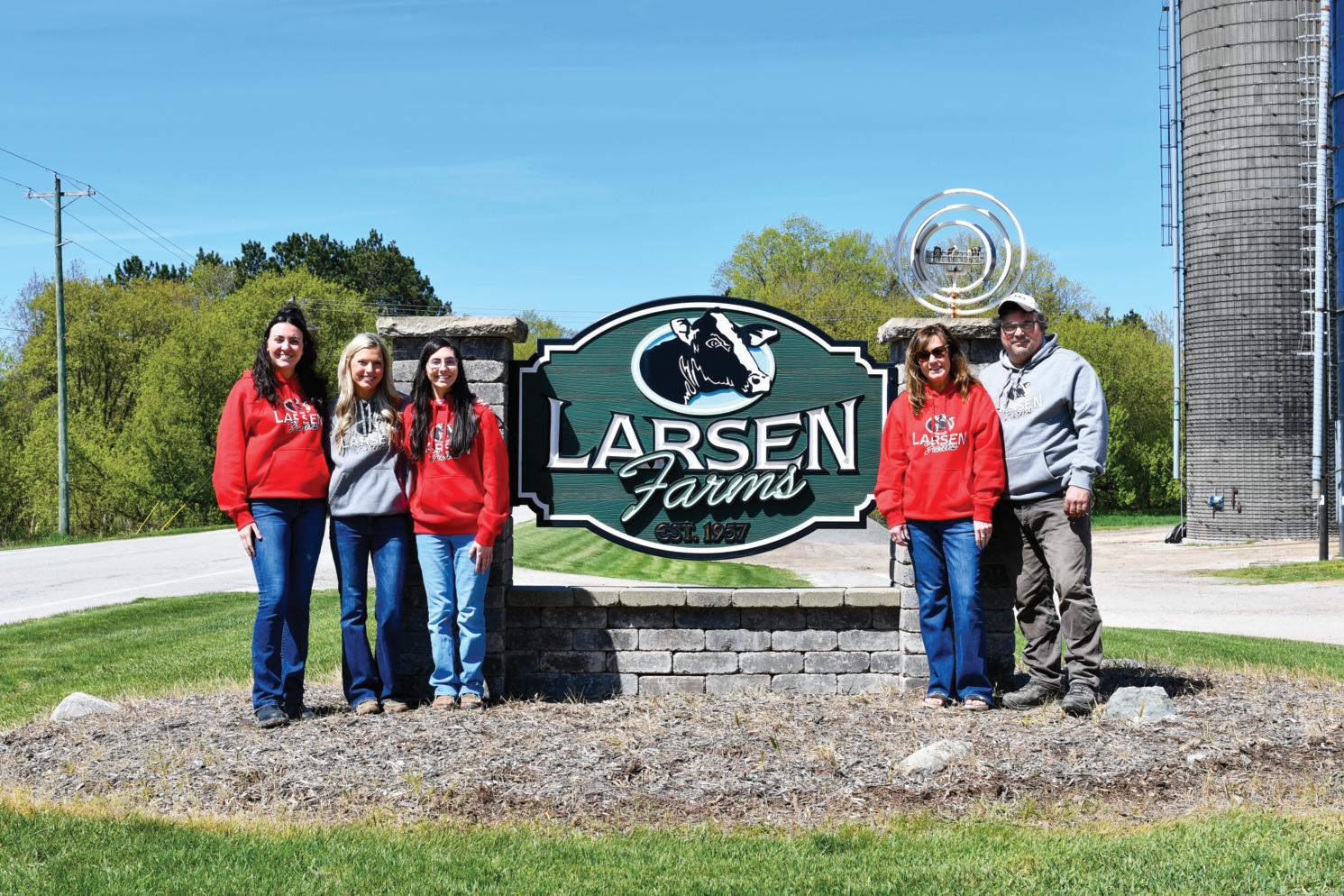
BY EMILY KITTENDORF-KING

Larsen Farms recognized with MMPA Food Bank Legacy Award for bringing fresh milk, and a spirit of service, to families in need through Caritas Food Pantry.
Every Monday and Wednesday at noon sharp, the front door of Caritas Food Pantry swings open to a steady stream of neighbors seeking a little extra support. Just inside, the cowprint cooler stands illuminated beside the entrance, its shelves lined with half gallons of milk, made possible by the Larsen family.
For Deb, one of the pantry’s long-time volunteers, those cartons are more than inventory, they’re a statement of community care. “Sometimes a big family comes in with seven kids and we know they need an extra gallon of milk,” she says. Because of the Larsens’ weekly contribution, Deb knows they’ll have enough to meet that need. Those cartons may look ordinary, but for members in the community, they’re vital. They mean children can enjoy cereal without hassle, parents can add richness to casseroles and everyone who walks through these doors knows their community cares. The small acts, like donating a cartful of milk, make a dependable difference in people’s lives.
Making a difference in people’s lives is at the root of what Caritas Food Pantry began doing more than a decade ago. As highschool students needing volunteer hours, Lindsay, Leah, and Leta Larsen signed on to help, stocking shelves in Caritas Food Pantry’s original, tightly packed Scottville location. They quickly noticed the same handful of canned goods and powdered milk cartons on every visit.
“We started volunteering there and realized that all they were giving was powdered milk,” Lindsay recalls. “And we thought, ‘That really is a bummer.’” As children being raised on their family’s dairy farm in Scottville,
. . . the Larsens saw a clear gap: without refrigeration fresh dairy was simply out of reach.”
Michigan, they knew that powdered milk couldn’t replace a cold glass of milk.
In that moment, the Larsens saw a clear gap: without refrigeration, fresh dairy was simply out of reach. That simple realization, born of stocking shelves shouldertoshoulder with pantry volunteers, set the stage for a
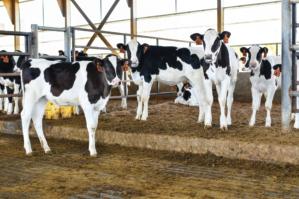
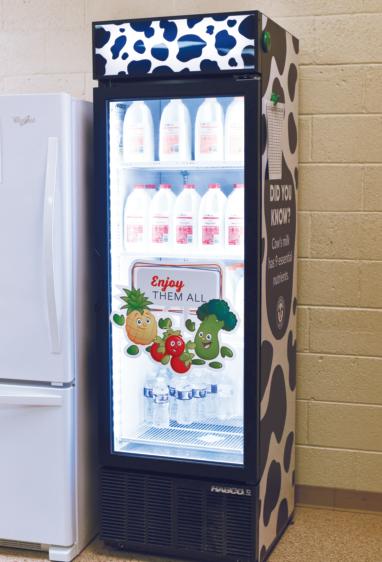
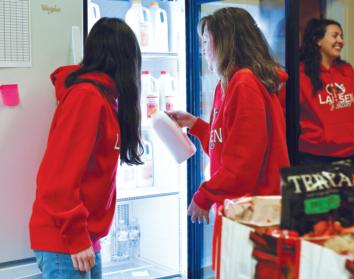
of Larsen Farms, said. “It felt like, okay, we’re really going to make this thing work.”
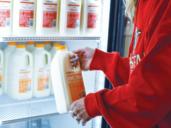

The cooler itself became a bit of a symbol, painted with cow print, hard to miss and always running.”
partnership aimed at bringing fresh dairy out of the realm of nice-to-have and into a provided staple for families in need.
Once the Larsens saw the need, it took time and the pantry moving to a more spacious location in Custer, Michigan, for them to set to work making it happen. In 2019, Lisa Larsen, the family matriarch, took the lead, drafting a grant proposal that would fund both a commercial-grade cooler and the pantry’s first orders of fresh milk thanks to the United Dairy Industry of Michigan’s food pantry grant program.
“Getting that cooler was a big deal,” Burke Larsen, the girls’ dad and owner
The cooler itself became a bit of a symbol, painted with cow print, hard to miss and always running. “Just seeing the cooler in there with the cow print is cool,” Lindsay said, smiling. “Everybody keeps track of the temperature and keeps it clean,” Burke noted. “They take care of it because they’re proud of it.”
From there, the routine was simple but steady. “Mom goes every Monday and buys milk and brings it to the food pantry,” Lindsay said.
The result? A once-empty wall of the pantry now holds one of its most valued staples. A grant may have started it, but the Larsens’ commitment has kept it going, turning a one-time project into an everyday source of support for families. The community response was immediate. “Milk went like that compared to the powder,” Lisa said, snapping her fingers. “I know when they didn’t have it, people were like, ‘Where’s the milk?’”
The shift wasn’t just noticeable in the pantry’s inventory, it showed up in how families responded. “They’re so happy when they get it,” Lisa said. “There is a need for milk.” The pantry makes sure no one goes without. “They won’t refuse anybody,” she said.
For the Larsens, milk is more than a donation, it’s a connection to their own childhoods. “We grew up drinking milk every day,” Leta said. “A lot of kids don’t, especially in the summer when they’re not at school.”
Supporting the pantry is a humbling reminder of how easy it is to take the basics for granted.
“Last night when you got in from planting and opened the fridge to grab the milk, and Mom said, ‘We ran out,’ you were like, ‘Oh, no’” Lindsay said to her dad. “We take for granted having milk in our fridge.”
And for the families who visit Caritas Food Pantry, that single half gallon can mean more than anyone realizes. “When you see somebody’s smile when they’re being handed milk, it’s pretty cool to be a part of that, giving that to somebody,” Lindsay said.
The addition of fresh milk at Caritas Food Pantry hasn’t just improved meals, it’s created lasting moments of joy for both volunteers and families.
“Three years ago, around Christmas time, there was a veteran that came through, and he cried when I handed him a gallon of milk,” Leta said. “He didn’t realize we had a cooler. He just couldn’t believe it and then just started crying.”
It’s one of many stories that remind the Larsens why this work matters. “Milk’s not in every food pantry,” Leah said, “but it’s in ours.” And it’s there because the family keeps showing up.
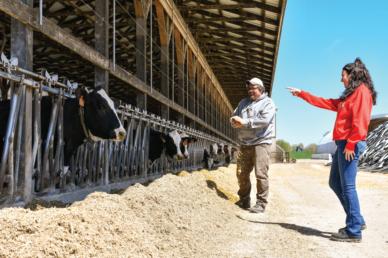
“During Christmas and Thanksgiving, they need more stockers,” Leta said. “That’s when we’ll go in and help.”
Lindsay added, “We’re doing it because it’s the way we can help. We can’t always spend every Wednesday there for three hours, but this is something we can do.”
The need for milk is constant, especially for larger households. The Larsens are doing their part to help their community, and they were recognized for their efforts by the Michigan Milk Producers Association (MMPA) and the Food Bank Council of Michigan (FBCM) with the Legacy Award this spring. The award recognizes an MMPA member for their efforts supporting their local food pantry and the recipient farm receives a $1,000 donation towards their food pantry.
“We are very honored to get $1,000,” Lisa said. Burke was quick to add, “I know Kelly will turn it into $2,000,” knowing the pantry’s manager would stretch the funds to reach even more people.
While milk remains the cornerstone of the Larsen family’s support for Caritas Food Pantry, they’re already thinking about what could come next.
“Butter would make the most sense,” Lindsay said. It’s something the pantry
When you see somebody’s smile when they’re being handed milk, it’s pretty cool to be a part of that, giving that to somebody.”
volunteers have asked about because it’s an item that many recipes call for. Lisa acknowledges though, “Butter is expensive, but a lot of recipes call for it, even boxed mac and cheese.”
Still, the family is hopeful. Growth takes time and coordination, especially when it comes to handling perishable products. Their focus as dairy farmers is to think about sustainability not just in environmental terms, but in terms of sustaining people.
“We’ve got to promote our product and get it out there, to nourish people and grow the community,” Burke said. And that starts right where they are: in a small town, with a milk cooler near the food pantry’s front door, stocked each week by a family who sees feeding their neighbors as part of their responsibility, and their legacy.
The Larsens got started with dairy in their food pantry by helping Caritas Food Pantry utilize the United Dairy Industry of Michigan's Food Pantry Grant to receive a cooler that can store dairy products. The grant is made possible by a partnership between the United Dairy Industry of Michigan (UDIM), Blue Cross Blue Shield of Michigan (BCBSM), Blue Cross Complete, and the BCBSM Foundation, with a shared commitment to reach more families in need.
Together, these organizations are working to equip Michigan’s food pantries with the tools they need to offer greater access to nutrientrich dairy and fresh food options ensuring that every pantry visitor has the opportunity to bring home dairy foods.
Dairy farmers who want to support their local food pantry can utilize their checkoff programs to apply for grants. For Caritas Food Pantry, the UDIM Food Pantry Grant allowed them to receive a commercial refrigeration unit, strengthening their ability to store and distribute milk and other perishable products. In addition to the cooler, Caritas Food Pantry received personalized operational support and $250 in dairy match funding to help stock dairy products for their community.
Visit milkmeansmore.org to learn more about grant opportunities.
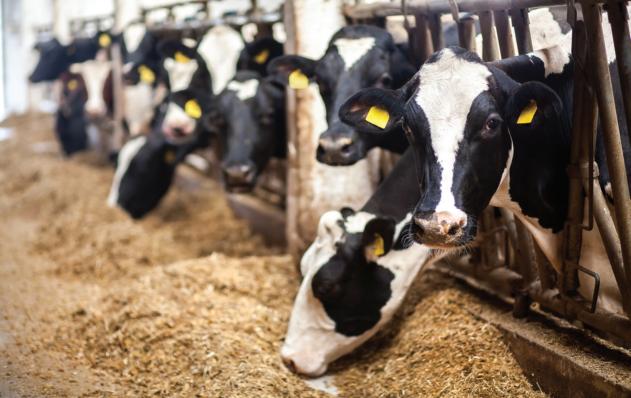



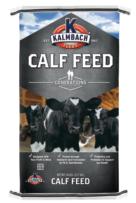

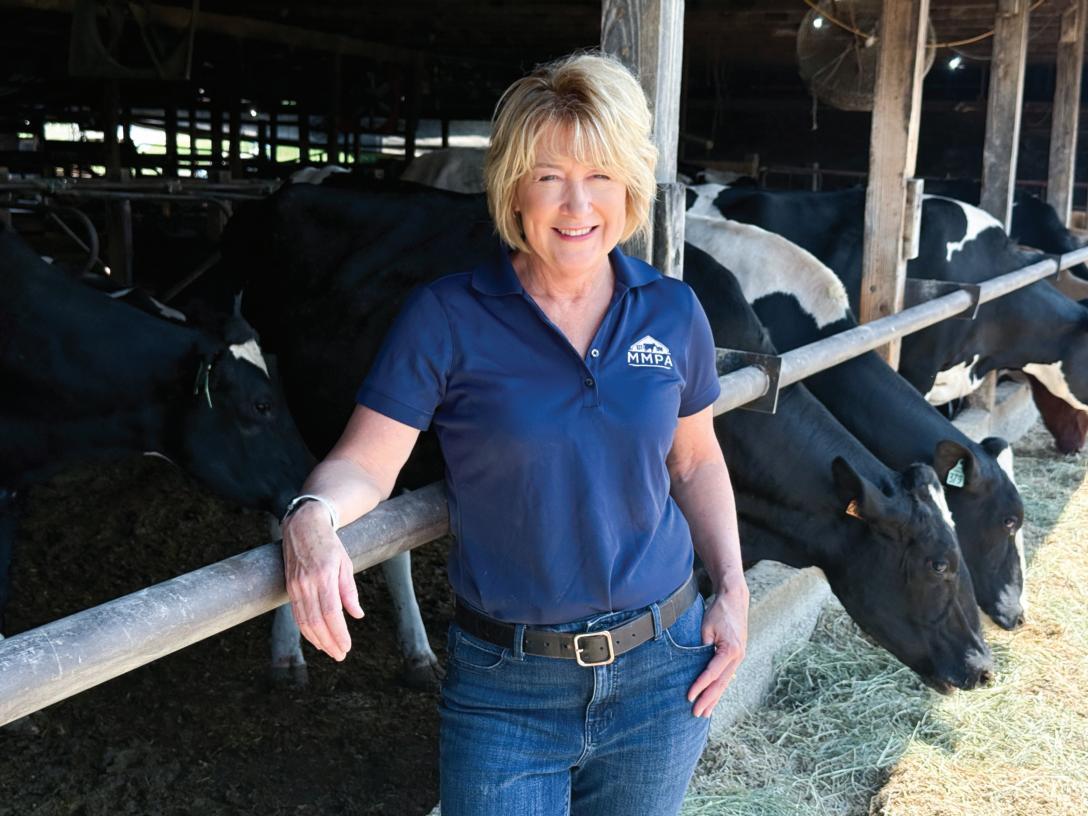

BY MIKAYLA BOWEN
In every industry, there are individuals whose contributions extend far beyond their job titles, those that shape the course of progress, lift up others and leave a legacy of excellence. In Michigan’s dairy industry, that is Sheila Burkhardt.
This year, Sheila was named the recipient of the 2025 Michigan Dairy Industry Service Award at the Michigan Dairy Industry Conference. A recognition that reflects nearly four decades of unwavering dedication, visionary leadership and humble service to Michigan’s dairy industry.
Raised on her family’s dairy farm in Lowell, Michigan, Sheila and her three siblings developed a firsthand understanding of the grit and commitment it takes to be a dairy farmer from doing chores, feeding calves and milking cows. This handson experience is what helps Sheila better understand MMPA’s members and meet their needs.
“I understand the work ethic that farmers have and that’s where I learned a lot of the responsibility that goes with operating a dairy farm,” Sheila explains. “I have a lot of respect for dairy farmers and the work they do every day. The ability to work for them and help make a difference is what keeps me going. I feel fortunate to be working in an industry that I grew up in and have a deep appreciation for.”
Though she chose not to return to the farm after college, Sheila’s path never strayed far from its influence. After graduating with a degree in agricultural communications from Michigan State University, Sheila joined MABC-Select Sires. Just seven months later, a connection through 4-H led her to an opening at MMPA. “4-H exposed me to so many different things in the industry that I probably would not have had the opportunity to experience without the program,” Sheila describes. “In addition to growing up on an MMPA member farm, I was further introduced to MMPA through participation in the MMPA 4-H Milk Marketing Tour when it was held at the Southfield MMPA office. My involvement through 4-H helped lead me to the position at MMPA.”
In 1988, then General Manager, Walt Wosje, hired Sheila to lead what was essentially a one-person Member Relations department, with an administrative assistant by her side.
“Shortly after I became General Manager of MMPA, the Director of Member Relations & Public Affairs retired,” stated Walt. “I was faced with hiring a new person for this very important position. I did not want to miss on this critical appointment. The attributes I was looking for was a person with youth (for longevity in the position), energy, a bright personality, knowledge of the dairy industry and
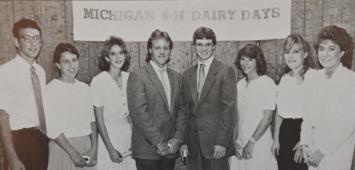



“In addition to growing up on an MMPA member farm, I was further introduced to MMPA through participation in the MMPA 4-H Milk Marketing Tour . . . My involvement through 4-H helped lead me to the position at MMPA.”
SHEILA BURKHARDT
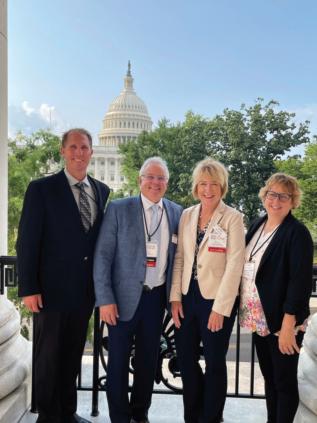
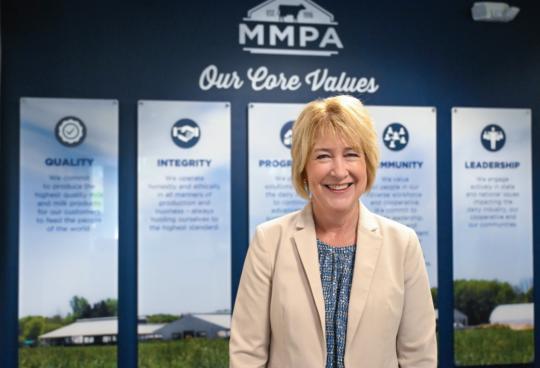
dedication to the company. After interviewing several candidates, it was very apparent to me that Sheila was the person who checked all the boxes. It was an absolute pleasure to work with Sheila. She is a “top notch” person in all respects. I congratulate her in receiving the 2025 Michigan Dairy Service Award.”
Sheila recalls, “When I started, we had 12 districts and 60 locals, which all had in-person meetings that were organized through phone and mail correspondence. There weren’t any computers or email at the time, yet organizing over 100 member meetings in a year was not unusual.”
Her position also included organizing various member educational programs, working through legislative issues, and at the time managing the weekly industry update radio show with the Michigan Farm Radio Network.
Over the years, Sheila’s career grew alongside the cooperative. Her position evolved to incorporate work with communications and the member services team. Today, she serves as
secretary on the board of directors and remains deeply involved in government relations, legislative work and industry strategy.
Reflecting on that evolution, she says, “Learning about the legislative side of my responsibilities, I basically just had to jump in and learn from the resources that were available at the time. There wasn’t any internet to look things up or emails to ask questions.”
Many of the resources are those she continues to turn to today, including the National Milk Producers Federation and other groups who helped her understand the impact of legislative issues on dairy producers and how to create change. It marked the beginning of Sheila forming relationships and partners that would go on to define her career and make her the industry titan she is today.
“Over the years I have had the opportunity to work with MMPA general managers/President/CEOs who have been great mentors for me - from Walt Wosje and John Dilland to Joe Diglio. They are all passionate
about dairy and MMPA’s success and are well respected in the industry,” she says. “That also goes for the Board Chairmen that I have worked closely with, originally Elwood Kirkpatrick, then Ken Nobis and now Doug Chapin. I have learned a lot from them and the dedication they have to the dairy industry.”
These mentors are behind Sheila’s steady leadership, providing a deep well of guidance and example who have shaped her approach and strengthened her commitment to the cooperative’s mission. Due in part to their influence, Sheila has played a key role in many of MMPA’s most historic milestones: the coop’s hundredth-year anniversary, the 2023 organizational restructuring and countless decisions that have positioned MMPA better in the marketplace. With thoughtfulness and precision, she helps guide from concept to reality, ensuring member voices are heard, governance remains strong and the organization is positioned for growth.
Of all her achievements, she points to the 2023 restructure as one of the most meaningful. “It wasn’t my accomplishment,” she says humbly, “but it’s something I’m proud to have helped make happen. It was a result of a lot of work and input from the membership and so meaningful to see the proposal receive unanimous support.”
Sheila’s leadership was equally vital in times of crisis. From navigating the unprecedented challenges of COVID-19 to responding to the recent spread of highly pathogenic avian influenza (HPAI) in dairy herds, Sheila coordinated with government agencies, industry partners and members to keep communication clear and timely during periods of uncertainty.
“I will never forget maneuvering through COVID-19,” Sheila states. “The impacts that followed not only from a member meeting perspective moving to more virtual, but through legislative efforts, supply chain issues, working with food banks, communications, etc. were massive.”
Those who work closely with Sheila describe her as open-minded and fully committed to the people she serves. She is always looking at things from other’s perspective to come up with a solution that she knows will best achieve what everybody wants. Whether working with state lawmakers, MMPA board members or the next generation of agricultural
leaders, she is trusted to listen, deliver and find solutions that move the industry forward.
“Sheila is the consummate professional who embodies the spirit of the dairy industry through connections and expertise. Her innate ability to stay connected to the ever-changing dairy environment demonstrates her commitment and dedication to not only our member-owners but to all dairy producers,” states Joe Diglio, MMPA President & CEO.” “She has been a great leader and champion for our MMPA team as well as instrumental in partnering with me on initiatives that algin on our vision. I can’t think of a more worthy person to receive this amazing award.”
Outside of work, Sheila enjoys spending time with her family, but even in that, MMPA played a role.
With a laugh, she explains, “I met my husband on a blind date set up by someone that worked in the member services department at the time.”
Sheila is the consummate professional who embodies the spirit of the dairy industry through connections and expertise . . . She has been a great leader and champion for our MMPA team.”
JOE DIGLIO, MMPA PRESIDENT & CEO
Her service extends beyond MMPA as well. Sheila serves, or has served on, numerous boards, including the Michigan 4-H Foundation, Michigan Dairy Memorial and Scholarship Foundation, Michigan Livestock Expo, Michigan Youth Livestock Scholarship Fund and the Midwest Council on Agriculture. Her resume is impressive, but she’s quick to shift the credit to those around her.
It’s a fitting example of how deeply connected Sheila’s personal and professional life has been. But her influence reaches far beyond moments like these. She helped modernize an organization steeped in tradition while remaining rooted in the values that matter, integrity, hard work and service to members. She’s been the bridge between generations, technologies and ideas, all while staying true to her roots and being motivated by the simple “ability to make an impact.”
Today, the Michigan dairy community honors not only her accomplishments, but the way she accomplished them, with humility, excellence and heart.
“I was very surprised when I had heard I received the Michigan Dairy Industry Service Award,” Sheila states. “I am deeply honored and very humbled to receive the award.”

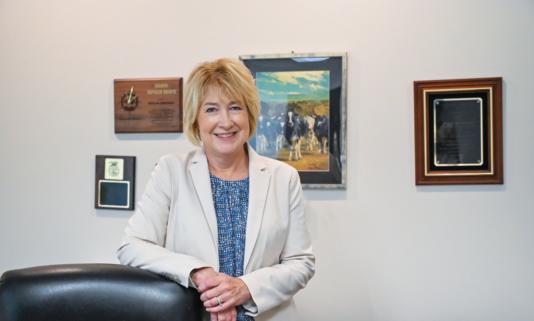
















Discover more about how dairy’s partnership with Domino’s helped sell an additional 3 million pounds of cheese. Domino’s leaders, Jim Zimmer and Kris Holley, and Rebecca MacKay Allen, Senior Vice President, Global Growth Platforms & Partnerships at DMI recently spoke with DMI’s Scott Wallin about the success of the Domino’s Smart Slice program with schools. They highlighted the 16-year partnership, which has grown from 300 to 21,000 schools, and serves more than 59 million slices of pizza, to boost cheese sales. Scan the QR code to list.

Barb O’Brien, CEO of DMI, discussed the State of the Industry report with its authors, Will Loux, analyst with NMPF and U.S. Dairy Export Council, and Mike McCully, DMI consultant, in the podcast linked below. DMI commissioned the report in early 2024 and highlights the unprecedented $8-$10 billion in new and expanded dairy infrastructure.
Key findings include the significant impact of new cheese plant capacity, consumer recovery from high inflation, and structural changes in the dairy industry in China. The report emphasizes the checkoff’s need to invest in strategies focused on new product innovations and research, new technologies, and a strong commitment to meeting global demand, as well as the ability to adapt to changing market dynamics. Scan the QR code to listen.
Celebrating with Dairy at the Indy 500
After a historic finish to the 109th running of the Indianapolis 500 ® on Sunday, May 25, dairy farmer Abbie Herr of Herr Dairy in Kendallville handed off the iconic bottle of milk to Alex Palou of Chip Ganassi Racing. With over 7 million viewers on Fox Sports and a sold-out crowd of over 350,000 in the Speedway, we are proud of the international spotlight shown on our dairy farmers and the work they put in to bring this trophy of excellence to the victory podium each year. Palou chose to savor the drink of milk instead of pouring it on himself as many excited drivers have in the past. He had also requested milk for his daughter Lucia. Ashley Stockwell of Stockwell Farms in Hudson handed bottles of milk to the team owner and chief mechanic as well.


Dairy in the Fast Lane: UDIM Shines at the Amway River Bank Run
UDIM supported the Amway River Bank Run in Grand Rapids, which features the largest 25K road race in the United States. Runners answered trivia questions to win dairy-themed swag. The questions engaged participants on key dairy topics including the benefits of chocolate milk for recovery, facts about raw milk and how dairy can be enjoyed by those with lactose intolerance. At the finish line, the UDIM team shared more than 6,000 bottles of chocolate milk. Not only did runners receive a refreshing recovery drink—they also walked away with helpful information that builds trust in dairy and supports chocolate milk as a smart post-exercise choice.
Participate in the #MIDairyBucketList this Summer
From backyard BBQs and road trips to quick breakfasts and poolside snacks, dairy is at the heart of so many summer moments. This season, UDIM is helping consumers celebrate dairy’s role in their lives with the MI Dairy Bucket List Challenge and we’d love for you to share and participate! We’re encouraging Michigan families to enjoy dairy in fun and meaningful ways all summer long. You can get involved by sharing your own #MIDairyBucketList—whether that’s enjoying a new dairy recipe, making a milk carton craft with your kids, treating a friend to an ice cream cone, or simply highlighting how your family fuels up with dairy.
It’s also a contest!
If your post on Facebook, Instagram, or TikTok is re-shared by UDIM, you’ll receive a prize pack.
Complete 10 or more bucket list items and you’ll be entered to win a Ninja CREAMi!
Let’s show Michigan how dairy makes summer stronger, one memory at a time. Complete your bucket list by August 22. Visit https:// milkmeansmore.org/mi-dairy-bucketlist/ to learn more!
To encourage families to choose dairy foods, the American Dairy Association Mideast created a short video for the Greater Cleveland Food Bank to play on their in-facility TV monitors. The video, which includes both English and Spanish captions, highlights dairy’s nutritional benefits, lactose-free options and storage tips. The video has been made available to other food banks throughout the country via the Dairy Nourishes America toolkit, which was developed by Feeding America and the Innovation Center for U.S. Dairy to increase access to nutritious dairy foods for people facing food insecurity.
To share the latest dairy nutrition science with health professionals, ADA Mideast exhibits and sponsors speakers at several high-profile meetings throughout the year. These conferences also provide an opportunity to highlight resources to help educate patients about dairy’s health benefits. This past April and May, ADA Mideast reached more than 1,000 pediatricians, physicians and registered dietitians about the importance of including dairy in the diet, specifically highlighting dairy’s role in early child brain development.
The Freeliners column is open to current MMPA members who wish to advertise—at no charge— goods or services relating directly to their dairy farm operations.
• An item submitted will be published for no more than two consecutive issues (one issue, unless otherwise requested). After that, it will be withdrawn.
• It will be published again for no more than two consecutive months only if the member resubmits the item by writing or calling the Novi office.
• Reference to a name of a firm or other commercial enterprise with which a member is involved will be deleted, with permission of the member.
• If the member does not wish such deletion, he/she may choose to have the item published as a Classified Ad at the regular per-line rate.
FOR SALE: Polled Holstein, Jersey and Norwegian Red bulls. AI bred from very functional dams. Many young bulls to choose from. Hardy and healthy with strong feet and legs, raised on pasture. Competitively priced. Young beef bulls also available. For pictures and pedigrees call or text 906-287-0746.
FOR SALE: 4-ton feed bin with flex auger. Call 810-728-6237.
FOR SALE: Dairyplan C-21 software system with computer. Call 810-728-6237.
FOR SALE: John Deere 348 baler with number 40 thrower, inoculant applicator, ready to work. $7,900. Call 810-728-6237.
FOR SALE: New Holland 890 chopper with 27P hay head. Low use. $6,500. Call 810-728-6237.
FOR SALE: New Idea bale conveyor, late model 50’, good shape. $3,750. Call 810-728-6237.
FOR SALE: H&S 5126 side slinger manure spreader. Call 989-551-5977.
FOR SALE: Urban auto calf feeder with 3 calf feeding stations. Asking $4,500 or best offer. Call 231-425-6913.
FOR SALE: Little Giant hay elevator, 45 ft., complete, new condition. $2,500 OBO. Call 616-406-5611.
FOR SALE: GEHL 970 18ft forage wagon, tandems. $3,500. Call 616-406-5611.
Cost for classifieds is $25 for the first 35 words and then $5 for each additional word. Payment due with order. All ads must be received by the 10th of the month preceding desired month of publication. MMPA neither sponsors nor endorses products or services advertised in the Milk Messenger.

Co-Products Menu
Soybean meal, canola meal, hominy, oat hulls, wheat midds, citrus pulp, malt sprouts, beet pulp, soybean hulls, cereal feed, cottonseed, distillers, gluten feed, wet feeds and more!
Contact merchandisers at ZFS, Inc: MI/IN/OH: 866.888.7082 WI: 800-523-6760 www.zfsinc.com/divisions/ingredients
O PPERMAN GROOVING: We can fix your scabbled floors. Diamond sawed grooves, no hammering or cracking of concrete. No hoof damage. Call Opperman Grooving Inc., Portland. 517-647-7381.
DAVIDSON CEMENT GROOVING, INC: No water needed. Wider, rougher grooves for better traction. We also offer texturing for your previously grooved floors. Three operators will travel Michigan and other states. No interest payment terms. Est. since 1987. Call 1-800-365-3361.
CONCRETE GROOVING BY TRI-STATE SCABBLING, home of the 2” wide groove. Best traction, lowest prices. 800-554-2288. www.tristatescabbling.com
A SURE WAY TO KEEP YOUR COWS UPRIGHT! Concrete grooving/texturing provides high quality traction in new and old concrete, fast service. NIENOW GROOVING. Call Cliff at 989-635-1494.

Mastitis remains one of the most prevalent and costly diseases in the dairy industry, but with Bartovation LDH Test Strips, early detection is both simple and cost-effective. These cow-side test strips are designed to measure lactate dehydrogenase (LDH), an enzyme released into milk when udder tissue is damaged during subclinical infections.
Scientific studies confirm that monitoring LDH activity in milk is a reliable method for identifying subclinical mastitis before clinical signs appear. This on-farm diagnostic tool helps producers respond quickly, protecting herd health and preventing lost milk production.
Stock Number: 699888 | Price: $23.23 each
FOR SALE: NEW & USED MILK TANKS. We stock all sizes, makes, models. Special prices to co-op members, corporate & private farms. Contact us anytime day or night. Special on 2000 gal. Muellers for $13,900 & up. 2700 & 4000 gal. Muellers call for quote. 800-558-0112.
STRAW & DRY HAY (LARGE & SMALL BALES). Feed Oats, Feed Barley and Corn Silage. Delivery Available. 989-723-1886 or 989-277-1414.
ALFALFA HAYLAGE (EXCELLENT & FAIR GRADES) & CORN SILAGE. 989-723-1886 or 989-277-1414.
SEED CORN - “Minnesota 13” Open Pollinated 85-Day Yellow Field Corn Seed. High Protein, High Yield, High Fat, Fast Drydown. Great Digestibility! 80,000 graded seeds $100.00 JanksSeeds.com 989-284-5052.
OPEN POLLINATED CORN SEED. Early Varieties
***Green Haven Open Pollinated Seed. Hulles Oats, Einkorn Wheat. Call 607-566-9253 or visit www.openpollinated.com
Using the test is easy:
1. Dip the strip into fresh milk.
2. Shake off excess.
3. Wait three minutes and compare the color to the provided chart.
By identifying infections early, producers can prevent the condition from progressing, safeguarding both your animals and your bottom line.
How to Order MMPA Merchandise from the FARM SUPPLY STORE
Order online: mimilk.com/farm-supply-store
Call in your order: Main Line: 989-317-8370
Toll Free: 877-367-6455
Orders (Novi): 800-572-5824 then dial 2
Fax in your order: 989-317-8372
These are SERVICE personnel only. Order your supplies through your hauler.
24-Hour Medical Emergency Hotline: 1-800-328-0026
Service Message Center: 1-800-392-3392
Service Representatives:
» Pat Mitchell – 517-403-0928
7273 N. Rollin Hwy., Addison, MI 49220
» Jason Wolfe – 540-553-5755
890 Canter Drive, Riner, VA 24149
Ben Chapin, Remus, Member Services Director ...............989-289-0731
Steve Lehman, Ithaca, Raw Milk Compliance ............................989-330-1638
Doug Soehnlen, Member/Superior Supply Representative ....330-575-4643
Joe Packard – Area Supervisor....................................248-520-3481
Logan Archibald, Fowlerville ......................................................947-265-0817
Brandon Ewers, Coldwater .........................................................231-414-4539
Alyssa Stace, Elkhart, IN, Animal Care/Sustainability ...............269-967-7351
Emily Patton, Lansing .................................................................248-880-3785
Christy Dinsmoore – Area Supervisor ............................248-513-7920
Chelsea Smith, Falmouth, MI .......................................................231-519-2455
Ella Cloud-Schneider, Caro, MI ...................................................269-245-6632
Cristen Cornell, Remus, MI.........................................................248-826-6294
Sarah Michalek – Farm Sustainability Manager ..............248-305-0537
Deb Gingrich, Leroy, Animal Care/Sustainability .....................248-520-3580
Rachel Rogers, Charlotte, Sustainability Coordinator ............. 248-826-7243
Novi (Monday-Friday, 8 a.m.-4:30 p.m.)
In Michigan ..........................................................................800-572-5824
Toll Free ..............................................................................800-233-2405
Ovid (Daily, 6 a.m.-10 p.m.) .........................................989-834-2515
Constantine (Daily, 7 a.m.-10 p.m.) ..............................800-391-7560
Farm Supply Supervisor
Main Line .............................................................................989-317-8370
Toll Free ..............................................................................877-367-6455
Orders (Novi) ....................................................800-572-5824, then dial 2
Fax .......................................................................................989-317-8372
Farm Supply Sales Representative
Jake Riley, Mt. Pleasant .........................................248-912-5070
John Lehman, Elsie, Bulk Tank Calibration .............248-444-6775
Main Office
Local line .............................................................................248-474-6672
Toll free...............................................................................800-572-5824
President and Chief Executive Officer
Joe Diglio ......................................................................................ext. 202
Chief Financial Officer
Aaron Anticic ................................................................................ext. 277
Chief Corporate Affairs Officer
Sheila Burkhardt ..........................................................................ext. 208
Chief Operating Officer
Brad Parks .....................................................................................ext. 341
Laboratory Supervisor
Teresa Farmer ................................................................................ext. 219
Quality
Sudeep Jain ..................................................................................ext. 305
Member Services
Emily Keranen ..............................................................................ext. 203
Human Resources
Kelly Kerrigan ................................................................................ext. 301
Sales
Molly Costaris ...............................................................................ext. 209
Communications
Emily Kittendorf-King ..................................................................ext. 234
Corporate Controller
Jeannie Strain ...............................................................................ext. 312
Member Relations
Jessica Welch ...............................................................................ext. 303
Canton, Ohio
Matt Rogers, Plant Manager..................................................330-477-4515
Constantine, Michigan
Dave Davis, Plant Manager ..................................................269-435-2835
Ovid, Michigan
Rodney Gutierrez, Plant Manager ........................................989-834-2221
Middlebury Cheese Company, Middlebury, Indiana
Plant Manager .......................................................................574-825-9511
If you are unable to reach your assigned member representative, please contact the representatives listed in your area. Your assigned member representative is listed on your quality statements or can be found by visiting mimilk.com/contact/field-staff and searching by your producer number.


A hay bale rests in fields below, where sunset sets the sky aglow. The scent of clover, sweet and thick, clings to boots and memories quick.
The pasture hums, the cool winds glide, as bales rest peacefully side by side. In that soft hush, the world feels wide, a farmer’s peace at evening time.
